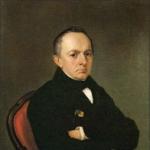The first visit to the publishing house by the future writer was very early. At the age of 7, having written in block letters "The Tale of the Bear", he himself took it to a children's publishing house. S. Mikhalkov began to print from the age of 14. It was the poem "The Road" in the July issue of the magazine "On the rise" in 1928 (Rostov-on-Don). In 1928, Mikhalkov was enlisted in the Terek Association of Proletarian Writers.
At the age of seventeen, Mikhalkov comes to Moscow. He enters the literary institute, while working at the Moskvoretsky weaving and finishing factory, in the summer he travels as an assistant to the topographer of a geological exploration expedition to Kazakhstan, and works in the survey party of the Moscow Directorate of Overhead Lines on the Volga.
This life experience is reflected in his poems, which since 1933 began to appear on the pages of Pravda, Izvestia, Komsomolskaya Pravda, Evening Moscow.
In 1936, the first collection of Mikhalkov's poems for children was published. Its success largely determined the future creative way poet. Per a short time he becomes known as a writer who can talk to children.
The work of children's writers and poets is subject to such requirements as the relevance of the topic, the availability of presentation, entertaining, the ability to vividly convey the signs of the times. The works of Sergei Mikhalkov for children meet these criteria. They are witty and imbued with love for children.
A rather important part of Mikhalkov's work for children are humorous and satirical works. The poet comically depicts boasting, arrogance, stubbornness, self-confidence, spoiledness and other shortcomings of children and adults. The author's assessment is quite definite, and sometimes even declared directly, but this does not deprive the poem of naturalness.
Ridicule of common shortcomings in character and behavior also found a place in Mikhalkov's fables, many of which the poet addresses to children ("Hare and Turtle", "Polkan and Mongrel", "Cats and Mice", etc.).
Mikhalkov created a number of satirical characters, whose names became widely known and became household names.
Such, for example, is the stubborn, unbelieving Thomas in the work of the same name, which has not lost its place in children's reading over the years, retaining its fascination and educational potential. Using the technique of hyperbole, traditional for the satirical genre, the poet ridiculed the arrogant, who, contrary to the facts, contrary to sound and reasonable judgments, considers his thoughts to be the only correct and immutable ones.
Foma comes in his stubbornness to the point of absurdity, denying the completely obvious, even the very fact of his own existence. Once in the mouth of a crocodile, the hero does not want to fully recognize anyone's opinion, except his own.
For all the comical behavior of Thomas, the poet with obvious sympathy refers to his young self-confident hero. Understanding of child psychology, love for children with their strengths and weaknesses are the basis of such an attitude.
The grotesque technique was also used by Mikhalkov in the poem "About the Mimosa", in which the image of a pampered, spoiled, crippled boy is masterfully drawn by excessive unreasonable parental care. This poem sounds somewhat harsher because it is addressed to adults as well as to children. Yes, and the object of satire is not behavior, which is quite explicable by the difficulties of human self-determination in the world, but, so to speak, acquired, not at all a natural shortcoming - effeminacy, inability for practical life.
The popularity of Mikhalkov, the author of humorous poems, is wide among children: “My friend and I”, “Sheep”, “Horseman”, “What do you have?” The cheerful tone of the poems is attractive, the adventures of two friends - the owners of siskins, hedgehogs and snakes, are funny, the clumsy antics of a bouncer and an eccentric, an unlucky rider are comical.
In 1939, Sergei Mikhalkov's comedy Skates appeared. The plot is simple." Pioneer Vasya Petrov finds someone else's money and returns it to its owner. But he spent a small part of the money he found to buy skates for himself. His friends don't know about it. They are glad that Vasya acted so "nobly"; unexpectedly undeserved glory falls on him. The conflict escalates when it becomes known to everyone with what money the ill-fated skates were bought. The hero must make a decision that is responsible, difficult, but necessary above all for him. The question of conscience and truth, which cannot be hidden from oneself, becomes the most important in the play, which still attracts the attention of directors of children's performances.
The first theatrical fairy tale for the smallest, The Three Little Pigs, is also connected with the English literary tradition. This cheerful and moderately dramatic story about conscientiousness, prudence, reliability, which is opposed by comically shown laziness, frivolity, continues to delight the smallest children today. Best works S.V. Mikhalkov is characterized by breadth of generalizations, acuteness of problems, depth of content and accessibility of form.
Children's poems were much more successful, among which the poem "Uncle Styopa" stands out.
The name of the cheerful, kind and wise hero of the tetralogy "Uncle Styopa", "Uncle Styopa is a policeman", "Uncle Styopa and Yegor", "Uncle Styopa is a veteran" has long become a household name. Mikhalkov managed to create a charming image of an adult - a noble, humane, sympathetic older friend of "all the guys from all the yards." Uncle Styopa's attitude towards people is determined in a childish way by a natural faith in the triumph of goodness, the affirmation of justice.
In poems about Uncle Styopa, the strongest sides of Mikhalkov's talent, a children's writer, appeared: an optimistic view of the world, a bright faith in man, a cheerful, sometimes mischievous fiction, mild humor.
The main technique that Mikhalkov uses to create the image of his hero - poetic hyperbole - has a special character in this work. Uncle Styopa - "the most important giant" - a living embodiment of a calm, benevolent force that so captivates a child in heroes folk tale. But here this giant is introduced by the poet into the usual atmosphere of a big city, settled and “registered” by him in Moscow. Like any ordinary person, he works, thinks, has fun.
The hero gradually grows from work to work, along with the expansion of the horizons, the increase in the intellectual and moral capabilities of the young reader. For the smallest, the poet jokingly plays with the everyday details of the image:
I took Uncle Styopa in the dining room
Double lunch for myself.
Uncle Styopa went to bed -
He put his feet on a stool.
Sitting, he took books from the cupboard.
And more than once to him in the cinema
They said: - Sit on the floor
You, comrade, do not care!
But to the stadium
He passed for free:
Missed Uncle Styopa -
They thought they were champions.
From gate to gate
I knew all the people in the area,
Where does Stepanov work?
Where is registered
How does he live
Because everyone is faster
No special work
He filmed a kite for the guys
From telegraph wires.
And the one who is small
Raised at the parade
Because everyone should
See the army of the country.
Everyone loved Uncle Styopa,
Respected Uncle Styopa:
He was the best friend
All the guys from all yards.
Mikhalkov is not afraid to put his hero in a comic position. But, thus depriving his "giant" of fairy-tale convention, making him "his man" among the children-readers, the poet ingeniously seeks out such circumstances in which the huge growth of Uncle Styopa helps him to perform important and humane deeds: he takes out a kite, entangled in wires, saves from the fire of pigeons, a boy who has fallen into the river, a grandmother carried away on an ice floe, prevents a train crash. So, from the combination in the image of the hero of the funny and the heroic, the ordinary and the extraordinary, his great emotional-imperious power is made up.
Older readers of "Uncle Styopa" are able to catch the dynamics of the plot. The character of the hero is revealed in continuous action, each episode enriches this character, introduces more and more shades into his interpretation. But at the same time, the main basis of trust in the character is preserved - its accessibility, understandability, moral clarity, certainty.
Mikhalkov's works occupy a prominent place in Soviet and Russian literature. His poems, children's poems, fables, plays, film scripts and, finally, the words to three hymns deservedly brought him all-Union and all-Russian fame and fame.
short biography
Mikhalkov Sergey Vladimirovich was born in 1913 in Moscow in a family that came from an ancient noble family. His childhood passed in The boy received an excellent education at home. Already in early childhood he became interested in literature and poetry. AT childhood he started writing poetry. He wrote his first poem when he was only nine years old.
After some time, the family moved to the Stavropol Territory. In the late 1920s, he began publishing in local newspapers. Then he moved to Moscow, where he was forced to do physical work for some time. However, he never abandoned his studies in poetry. The young poet became famous throughout the country in 1935, when his poem "Uncle Styopa" was published. This was followed by the release of a collection of poems, which strengthened his fame. During the war years, he worked at the same time wrote the anthem. After the victory, he continued to publish his works, was engaged in active social activities, founded the Wick magazine. played an important role in the development of domestic literature, drama, poetry. The famous poet died in 2009.
Early writings
The first poems of the poet immediately attracted attention. The father noticed his son's talent and somehow showed his poems to the poet A. Bezymensky, who approved the young man's first experiments. One of the author's first works is called "The Road", in which he demonstrated his mastery of rhyme and language.
Mikhalkov's works are distinguished by brevity, conciseness and unusual expressiveness, largely due to the fact that the poet wrote from childhood in the best traditions of Russian classical literature. He grew up on Pushkin's poems and Krylov's fables, on the works of Mayakovsky and Yesenin. It is not surprising, therefore, that even his first literary experiments were very successful. Since 1933, his works have been regularly published in leading domestic magazines. One of the most famous works of this period is the poem "Svetlana".

Success
Mikhalkov's works were very popular and loved by readers even before his most famous children's poem was published. The glory of the children's writer was strengthened by the success of a new composition - the poem "Three Citizens", which he wrote during his participation in the competition for the best pioneer song.
After that, the author decided to try himself in a different genre and set about creating his own, probably the most famous work - the poem "Uncle Styopa". The image of a kind, simple-hearted giant, who is ready to help at any time, immediately gained all-Union love.
It took the poet several decades to create the famous tetralogy. After the war, the poem "Uncle Styopa is a policeman" and two others were published. In them main character, remaining still the same good-natured giant, gradually became more lyrical. Particularly touching, perhaps, is the part "Uncle Styopa and Yegor", in which the poet introduced the image of the protagonist's son.

Other writings
Mikhalkov's works became popular largely due to their optimism, lively and cheerful language, as well as deep worldly wisdom. In the pre-war period, another of his famous poems, “What about you?” Was published, which in form resembles a counting rhyme, but nevertheless is imbued with a serious philosophical sense and sound.
Another characteristic feature of Mikhalkov's work is that he often created heroes who could not always be a role model. On the contrary, quite often, in the images of his characters, he ridiculed the shortcomings that are inherent in children: laziness, effeminacy, rudeness, boasting. Many of his phrases turned out to be so well-aimed and witty that they turned into a proverb. His rhyme is extremely simple and is remembered literally from the first time (for example, his famous "Song of Friends", which is probably known to every child).

Works of the war years
During the war years, the poet worked as a correspondent, he visited many front lines, received a number of high awards for bravery. His military lyrics, like the works of Tvardovsky, are distinguished by their simplicity and easy language, reminiscent of folk songs, which immediately made it popular. Among the works of this period are, for example, the poems "A soldier lies behind the huts ...", "Letter home" and others. It is noteworthy that it is this poet who owns the epitaph on

Fables, plays, scripts
In the mid-1940s, Mikhalkov, on the advice of the writer Tolstoy, decided to try his hand at a new genre - writing fables (he had loved Krylov since childhood). His first works in this genre were a great success. In total, he wrote about two hundred fables, which were included in the golden fund of Russian literature. The poet also wrote the script for some famous Soviet films, one of the most significant is the comedy "Three Plus Two", based on his play.
A feature of the poet's work is that he was able to express very serious and deep thoughts in the most accessible form, while entertaining and teaching. Such, for example, is his poem "Sasha's porridge."
Mikhalkov's books are still sold in huge numbers in our country.
Sergei Vladimirovich Mikhalkov
to the 100th anniversary of the writer
for younger readers
"The beauty! The beauty!
We are bringing a cat with us.
Chizhik, dog
Petka - bully "
And today we have a cat
I gave birth to kittens yesterday.
The kittens have grown a little
And they don’t want to eat from a saucer!
Each of us, since childhood, these lines are well known. The author, one of the favorite children's poets - Sergey Vladimirovich Mikhalkov, 100th anniversary, which we will celebrate on March 13, 2013.
How did he become a children's writer? Since childhood, he loved the fairy tales of Pushkin A.S., the poems of Lermontov M.Yu., the fables of Krylov I.A. The passion for literature turned out to be so strong that at the age of 8 Sergey began to write his own poems and publish his own literary magazine at home. And since 1933, his poems began to appear in newspapers and magazines.
 "There lived a tall citizen,
"There lived a tall citizen,
Nicknamed Kalancha
By the name of Stepanov
And by the name of Stepan
Of the regional giants
The Greatest Giant"
("Uncle Styopa")
"I have a sad look -
My head hurts
I sneeze, I'm hoarse
What? It's the flu!"
("Flu")
But Sergei Mikhalkov not only composed himself, he also translated poems by foreign authors for children.
The most famous work, the words to which were composed by Sergei Mikhalkov, is the anthem of Russia. And also the words of Mikhalkov “Your name is unknown, your feat is immortal” are carved on the granite of the Eternal Flame near the Kremlin wall.
Sergei Mikhalkov during the Great Patriotic War was a war correspondent. He visited all fronts, wrote essays, notes, poems, humorous stories, leaflets, proclamations.
Sergei Vladimirovich throughout his long life wrote for both children and adults. And these were not only poems, but also stories, novellas, fairy tales, plays, fables, scripts for animated and feature films. For many years he was the author and editor-in-chief of the Wick film magazine.
More than one generation of children has grown up on the poems of their beloved poet, and today's children happily repeat:
What happened? What happened?
 The alphabet fell off the stove!
The alphabet fell off the stove!
We're going, we're going, we're going
To distant lands
good neighbors,
Happy friends.
We are having fun
We sing a song
And the song sings
About the way we live."
List of works by S. V. Mikhalkov
What do you have?/ S. V. Mikhalkov. - M. : Eksmo, 2002. - 48 p. : ill. - (Ladybug).
Storks and frogs: fables / S.V. Mikhalkov. - M .: Det. lit., 1989. - 29 p. : ill. - (We read for ourselves).
Cheerful tourist: poems / S.V. Mikhalkov. - M .: Det. lit. , 1989. - 16 p. : ill. - (My first books).
children/ S. V. Mikhalkov. - M. : Omega, 2005. - 160 p. : ill. - (For the little ones).
Uncle Styopa/ S.V. Mikhalkov. - M. : Oniks, 2008. - 40 p. : col. ill.
Bunny-Clever: a fairy tale in 2 acts / S.V. Mikhalkov. - M .: Det. lit., 1988. - 48 p. : ill.
Favorites/ S. V. Mikhalkov. - M. : Raduga, 1988. - 160 p. : ill.
How did the bear find the pipe?: story. - M .: Det. lit., 1981. - 20 p.
Carousel: poems / S.V. Mikhalkov. - M .: Planeta detstva, 1998. - 8 p. : ill.
Cats and mice: fables / S. V. Mikhalkov. – M.: Sov. Russia, 1983. - 79 p. : ill.
Favorite Pages: poems / S. V. Mikhalkov. - Smolensk: Rusich, 1999. - 250 p. : ill.
We're going, we're going, we're going...: poems / S. V. Mikhalkov. - M. : Samovar, 2003. - 108 p. : ill. - (Children's classics).
Me and a friend: poems, fairy tales, riddles / S. V. Mikhalkov. - M .: Det. lit., 1977. - 287 p. : ill.
Don't sleep! : poems, fairy tales, fables / S. V. Mikhalkov. - M. : AST: Astrel, 2010. - 352 p. : ill. - (Favorite reading).
Feast of Disobedience: poems, story-tale / SV Mikhalkov. - M. : Oniks, 2008. - 160 p. : ill.
The best verses: favorites / S.V. Mikhalkov. - M. : AST, 2010. - 160 p. : tsv.ill.
The Three Little Pigs and Other Tales/ S.V. Mikhalkov. - Rostov-on-Don, : Phoenix, 1999. - 319 p. - (Gold chain).
Publications in the Literature section
By the name of Stepanov and by the name of Stepan
This is a ticket of justice, kindness and honor. A literary character that could now be called a cult, but in fact he is a favorite. For many boys and girls who grew up on this story and read the lines of Sergei Mikhalkov to their children, and who already to their grandchildren. So from generation to generation they empathize with the good-natured giant: sometimes they can’t pick up clothes, sometimes they can hide behind a mask at the carnival - and they find an example to follow in the lines of the poem. The usual daily exploits of a real hero. We recall 10 facts from the life of Uncle Styopa and his creator, together with Natalia Letnikova.
To the pioneer camp - for inspiration. The pioneer song contest of the Moscow Committee of the Komsomol in 1935 called Sergei Mikhalkov on the road. In the children's camp near Moscow. The young songwriter worked as a counselor, went on hikes, had unhurried conversations by the fire, and fished. Impressions of the Pioneer summer became children's poems, which were printed by the Pioneer magazine. In the same year, Mikhalkov wrote the first children's poem - "Uncle Styopa".
Evgeny Migunov. Sketch of an envelope for a gramophone record with recordings of Sergei Mikhalkov's reading of the trilogy about Uncle Styopa. 1963

Konstantin Rotov. Illustration for Sergei Mikhalkov's poem "Uncle Styopa". Publishing house "Detgiz". 1957

Illustration for Sergei Mikhalkov's poem "Uncle Styopa is a policeman"
"I wrote the first part somehow very easily",- the poet himself later said. And the press was gone. The editor of Pioneer, journalist and writer Boris Ivanter, published the poem in the seventh issue of the magazine in 1935. Even without waiting for the giant's drawings, so as not to delay the publication. The first illustrations for the poem were photographs of the author himself, who high growth and kind eyes involuntarily compared with a literary character. So Sergey Mikhalkov woke up famous among a small but very demanding audience.
Masters rating. Korney Chukovsky predicted a long life for Uncle Styopa literary life- and I was not mistaken. Samuil Marshak also highly appreciated the poem about the high citizen. I read "Uncle Styopa" right in the presence of the young author, wished literary hero"grow up spiritually." “And if later I did not consider my “Uncle Styopa” an accidental episode in literary work, but continued to work for the young reader, this, perhaps, is primarily the merit of Samuil Yakovlevich Marshak”- said Sergey Mikhalkov.
To print! With illustrations... A separate book "Uncle Styopa" was published in 1936 by the publishing house "Children's Literature". For the first time, Stepan Stepanov was painted by the famous artist, the creator of the legendary Murzilka - Aminadav Kanevsky. Uncle Styopa was the entrance ticket to the world of book illustration for the artist German Mazurin. Konstantin Rotov created his image of a charming giant - the author of the panel of the Soviet pavilion at the New York exhibition; Yuvenaly Korovin, whose work is in the Tretyakov Gallery; and one of the founding fathers of Soviet animation - Vladimir Suteev.

Konstantin Rotov. Illustration for Sergei Mikhalkov's poem "Uncle Styopa". 1950s

Vladimir Galdyaev. Illustration for Sergei Mikhalkov's poem "Uncle Styopa". Moscow: Malysh, 1984

German Mazurin. Illustration for Sergei Mikhalkov's poem "Uncle Styopa is a policeman". Card. 1956
"Uncle Styopa is a policeman". "Border Guard", " New world”, “Pioneer”, “Pionerskaya Pravda”. In 1954, these editions that did not intersect according to the reader were united by a common material - the poem "Uncle Styopa - a policeman." The author himself told in the preface in Pioneer about one meeting - with a policeman ... two meters tall. “Taller than all the policemen I have ever seen in my life!” And in a friendly conversation it turned out that the policeman was also once a sailor. This is how the idea of a new poem appeared, which brought joy to the children, and to its creator - the Second Prize of the USSR Ministry of Internal Affairs.
At the request of readers. "Uncle Styopa and Yegor". Genuine interest in the family of the beloved giant pupils kindergarten, with whom Sergey Mikhalkov met, was forced to take up the pen again. The young reader was worried - is their pet lonely? Does Styopa have children? “What will I say to him in response? / It's hard to say "no". So Stepan found a family: wife Marusya and son Yegor - an exemplary child, an athlete and - in the spirit of the times - a future astronaut. "I'll tell you friends right away: / This book is on order",- admits the poet. A children's story published in the most serious periodical- the newspaper "Pravda".

Monument to Uncle Styopa in Moscow. Sculptor Alexander Rozhnikov. Photo: mos-holidays.ru

Monument to Uncle Styopa in Prokopyevsk (Kemerovo Region). Sculptor Konstantin Zinich. Photo: ngs42.ru

Monument to Uncle Styopa in Samara. Sculptor Zurab Tsereteli. Photo: rah.ru
Uncle Styopa in bronze. The two-meter guard is immortalized not only in children's literature. Five-meter Stepan Stepanov froze in bronze on the streets of Samara, as usual - surrounded by children. Local residents guess in the monument the features of Oleg Malinin, who served in this area - then still the city of Kuibyshev. The monument by Zurab Tsereteli is a gift to the city from the famous sculptor. He performed the work of casting the statue free of charge. In the capital, the bronze Uncle Styopa "settled" near the building of the regional traffic police in Slesarny Lane, and in Kuzbass - in the city of Prokopyevsk.
Screen life. Three years after the literary premiere, Uncle Styopa is already on the screen. One of the first at Soyuzmultfilm. According to the script by Sergei Mikhalkov and Deputy Editor-in-Chief of the Krokodil magazine, Nikolai Aduev, Vladimir Suteev drew a black-and-white story and made it come to life. A quarter of a century later, a colorful continuation of the famous giant's biography, "Uncle Styopa - a policeman," was published. The creator of the screen worked on the 1964 cartoon


Frame from the animated film "Uncle Styopa - a policeman" (1964)
Laughter Vitamin by Sergey Mikhalkov. “Humor in children's literature is a serious and big deal. Children need the laughter vitamin, - assured the poet. And children simply need poems by Sergei Mikhalkov. "What do you have?" and "About Foma", "Merry Travelers" and "Fintiflyushkin" and the dream embodied on the pages of Mikhalkov, perhaps, of every child - "The Feast of Disobedience". Sergei Mikhalkov's works have been published in the country with a total circulation of 300 million copies and have been appearing on bookstores for more than 80 years. Although the author himself modestly remarked: “I did not choose the children, but the children chose me. Why? For me it's a mystery.".
MYSTERIES ABOUT THE THREE PIGS
READERS OF ALL GENERATIONS,
YEARS FROM THREE AND TO A HUNDRED,
IT IS GIVED WITHOUT A DOUBT
YOUR SOULS, HEARTS, VOICES
QUIZ UNCLE STYOPA
SONG OF THE THREE PIGS
March 13 - the birthday of the famous poet, writer, fabulist Mikhalkov Sergey Vladimirovich, who gave us all the famous hero Uncle Styopa.
When designing the page, materials from the magazines "PRIMARY SCHOOL" No. 3, 2003, "Why and Why" No. 11-12, 2000, No. 5-6, 2002, Russian Children's Encyclopedia of Riddles.
SERGEY VLADIMIROVICH MIKHALKOV
(March 13, 1913 - August 27, 2009)
We know a lot of verses
We respect Uncle Styopa.
And we are not afraid of vaccinations -
We strive to be healthy
Let's sing a song of friends.
We live great!
COMPUTER GAMES
***
The nose is round, patchy,
It is convenient for them to dig in the ground,
Small crochet tail
Instead of shoes - hooves.
Three of them - and to what
The brothers are friendly.
Guess without a clue
Who are the heroes, what kind of fairy tale?
***
Oink oink oink -
What three brothers
No more fear of the wolf
Because that beast of prey
Will not destroy a brick house
What are the pig brothers' names?
LIST OF SCENARIOS OF MASS EVENTS
1. [Poems for children dedicated to S.V. Mikhalkov]// Children's literature. - 1998. - No. 3. - S. 96-97.
2. Adonina E.V. A poet from the country of childhood: [a lesson-journey through the works of S.V. Mikhalkov] / E. V. Adonina // Primary School. - 2003. - No. 3. - S. 28-31.
3. Alekseeva I. V. Through the pages of S.V. Mikhalkova: [script of the lesson with elements of theatricalization] / I. V. Alekseeva // Elementary School. - 2003. - No. 3. - S. 53-54.
4. Biryukova L.P. Favorite children's books creator: [script of a library holiday dedicated to S.V. Mikhalkov] / L.P. Biryukova // Primary school. - 2003. - No. 3. - S. 39-44, 46-47.
5. Brazyul G.V. Theatrical performance "What a company!" : [literary games based on the work of S. V. Mikhalkov] / G. V. Brazyul // Pedagogical Council. - 2003. - No. 8. - S. 3-5.
6. Fun day with Sergei Mikhalkov: [literary holiday for 1st grade students] // We read, study, play. - 1998. - No. 8. - S. 123-124.
7. Dyrina S. Crossword "Professions" (based on the works of S.V. Mikhalkov). Crossword "Animals (based on the works of S.V. Mikhalkov) / S. Dyrin // Elementary School. - 2003. - March (No. 9). - P. 4, 13.
8. Zurabova K. It was in the evening: [matinee, which was based on the poems of S. Mikhalkov] / K. Zurabova // preschool education. - 2003. - No. 3. - S. 70-74.
9.Kazantseva S. V. Strong, brave uncle Styopa and other characters: [literary matinee about S.V. Mikhalkov and his works] / S.V. Kazantseva // Books, notes and toys for Katyushka and Andryushka. - 2009 . - No. 8.- S. 10-12.
10. Koromyslova S.P. Kind and cheerful Sergey Mikhalkov: [library lesson in grade 3] / S. P. Koromyslova // Primary school. - 2003. - No. 3. - S. 32-34.
11. Crosswords based on the works of S.V. Mikhalkov// Primary School. - 2003. - No. 3. - S. 48-50.
12. Lezhneva O.S. Kind and cheerful talent: [literary event on the work of S.V. Mikhalkov] / O. S. Lezhneva // Leisure at school. - 2002. - No. 4. - S. 9-10.
13. Martemyanova T.G. Education by the art of the word: [material for conversations about the works of S.V. Mikhalkov, quiz] / T. G. Martemyanova // Primary school. - 2003. - No. 3. - S. 22-27.
14. Martynova V.S. We are going, we are going, we are going ...: [scenario of the holiday dedicated to S.V. Mikhalkov] / V. S. Martynova // Primary school. - 2003. - No. 3. - S. 35-36.
15. Nasibova B.A. Best friend of the guys: [script of the holiday dedicated to S.V. Mikhalkov] / B. A. Nasibova // Primary school. - 2003. - No. 3. - S. 37-38.
16. Ovsyannikova I.N. Feast of Disobedience: [ methodical development extracurricular reading lesson based on the story-tale by S.V. Mikhalkov "The Feast of Disobedience"] / I. N. Ovsyannikova // Primary School. - 2003. - No. 3. - S. 50-51.
17. Samkova N.S. We read a poem by S.V. Mikhalkov "Foma" / N. S. Samkova // Primary school. - 2003. - No. 3. - S. 52.
18.Sokolova O. The life and work of Sergei Vladimirovich Mikhalkov: [methodological development of a lesson dedicated to S.V. Mikhalkov] / O. Sokolova // Primary school. - 2002. - November (No. 47). - Tab. - S. 12-13.
19. Tukhvatulina V.M. Visiting Mikhalkov: [a lesson scenario with the participation of parents and children] / V. M. Tukhvatulina // Elementary School. - 2003. - No. 3. - S. 55-57.
20. Tsarenko L. The Three Little Pigs: [scenario of a theatrical performance based on the fairy tale by S. V. Mikhalkov] / L. Tsarenko // Preschool education. - 1998. - No. 8. - S. 14-17.
21. Tsarenko L. Three little pigs: based on the fairy tale by S. V. Mikhalkov: [performance] / L. Tsarenko // I enter the world of art. - 2002. - No. 2. - S. 75-80.
22. Shipovskaya N."Uncle Styopa - 68, Mikhalkov - 90!" : [questions for games, puzzle, contests] / N. Shipovskaya // Elementary School. - 2003. - March (No. 9). - S. 4, 13.
library poster on the shelf
Poster size 1024x723.
File size - 227 kb.
Click on thumbnail to enlarge and download


MOSAICS
"Uncle Styopa" (archive - 695 kb)
"Three pigs"(archive - 747 kb.)
QUIZ
"Poems by Sergei Mikhalkov": a quiz for younger students. The program counts the number of correct answers and the time spent on the game.
Archive - 2 mb.
"Merry company of Sergei Mikhalkov": PowerPoint-2003 quiz on poems and poem "Uncle Styopa". Archive - 4.1 mb.
"Uncle Styopa's Quiz": quiz PowerPoint-2007 based on the poem "Uncle Styopa". Archive - 2.3 mb.
FABLES AND HIS POEMS
KNOW EVERYONE.
DON'T READ THIS ANYWHERE
ONLY IN BOOKS
MIKHALKOVA.
Sergei Vladimirovich Mikhalkov
Vyacheslav Dulikov
A magician walks through Moscow
Spring sunny morning
Tall and unbowed
Like all wizards, wise.
He goes, and towards him -
Passers-by kind faces ...
Smile, murmuring speech
The capital meets him...
Poet and fabulist
satirist chronicler,
Creator of fairy tales and anthem,
What in the souls sounded inviting ...
Comes from the Rostov House,
Along the lanes to the Arbat,
Looks a little harsh
Rough and angular.
And someone will say quietly: -
Yes, this is Uncle Styopa,
Such famously - not famously,
Europe is so small...
He comes from childhood, like us,
Where do we go from childhood ...
For all dear interlocutor,
After all, he is a magician!

Even if you go halfway around the world,
You'll get around, you'll get around
You won't find a better home
You won't find it, you won't find it!
I have a good house.
New home, solid home,
I'm not afraid of rain and thunder
Rain and thunder, rain and thunder!
Of course, I'm smarter than everyone
Smarter than everyone, smarter than everyone!
I build a house from stones
From stones, from stones!
No animal in the world
Won't break through that door
Through this door, through this door!
We are not afraid of the gray wolf,
Gray wolf, gray wolf!
Where do you go, stupid wolf,
Old wolf, dire wolf?
No animal in the world
Cunning beast, terrible beast,
Won't open this door
This door, this door!
The wolf from the forest never
Never ever
Won't come back to us here
To us here, to us here!
1
. Of the regional giants
The most important giant
By last name _______ (?),
And named Stepan.
What was Uncle Styopa's last name?
2.
Uncle Styopa was walking from work -
It was visible from a mile away.
Respected Uncle Styopa
For this height.
What nicknames did the children give Uncle Styopa for his tall stature?
3. Famously measured steps
Two big legs...
What size shoes did Uncle Styopa buy for himself?
4.
I'll tell you a secret
That I serve in the police
Because this service
I find it very important!
Who served in the police Uncle Styopa?
5.
He walks around the area
From yard to yard.
And again he has epaulets on him,
With pistol holster.
In what military rank did Uncle Styopa serve?
6. Strong bold and serious,
He achieved his dream
In the study they gave a star,
In the conquest of heights.
To complete a task
On a rocket ship
Unearthly trials
He passed on Earth.
Who from the Stepanov family became an astronaut?
***
- I decided to build from stones,
I want my house to be strong.
Yes, it's long - made of stones,
Weave from the branches, so quickly!
And I'm a straw hut
In three hours I will put it to anyone.
Determine who owns these words.

EVERY GUY WILL TELL
ABOUT THREE FUNNY PIGS:
HOW THEY LIVED - DID NOT GROW
AND THE WOLF IS OUTFINED.
LET'S WE GUEST THEM
TODAY WE'RE GOING
LET'S SEE THE NAUGHTER BROTHERS,
AND THEIR MYSTERIES WE WILL GUESS

***
The wolf argued with the fox
At the edge of a pine tree:
"Naf-Naf built the first house,
And then Nuf-Nuf - the second."
But in response, the fox nervously:
"Listen, Gray, you're wrong.
Nif-Nif built the house first,
And the second - just Naf-Naf!".
The eagle owl said: "In a tricky dispute
I don't want flattery
But you definitely
There is one mistake."
Understand the dispute
Help them quickly:
Who built the first house
Who is third and who is second?




















